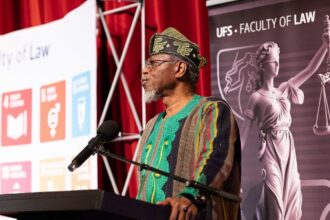Now that the remarkable decision by the President to approve ₦37 billion ($100 million) for the renovation of the National Assembly complex in the 2020 budget seems to be cooling off, perhaps, it is time to lay down the reality of the matter.
Despite arguments from lawmakers to justify this renovation, such a financial undertaking at this time would be unwise for the country, especially as it faces more urgent callings. The country’s infrastructure deficit is ever-growing and the majority of the population still languishes in poverty. What would be the need for a state-of-the-art building for lawmakers while the country is begging to be fixed? Instead, the money allocated for the renovation—this also despite the National Assembly having an existing maintenance budget—should be spent on improving major highways, the dilapidated educational and healthcare system. Nigerians would not stop echoing these alternatives.
Although Nigeria is Africa’s largest economy, it still largely depends on loans to fund infrastructure projects, which interestingly, the president plans to increase by 103 per cent. The fact that the country, despite its good revenue from oil over the years, still depend on loans to fund infrastructure projects, should teach some prudence. Among which is not to lavish billions of public funds on a government building.
ALSO READ: Sokoto to partner Britain on rejunevation of state legal system
In the budget, the president approved ₦37 billion for the legislative house. On the other hand, though, the agency responsible for maintaining the roads, the Nigerian roads, the Federal Roads Maintenance Agency (FERMA), only has ₦36.6 billion in its budget for 2020. How do we expect FERMA to fix our roads with the same amount of money the president is giving the lawmakers to fix one complex? Pressure should be put where it is due.
Equally ironic is the fact that the 2020 budget only includes a mere ₦48 billion for the Ministry of Education’s capital expenditure. This is more appalling considering over 70 million of the country is categorized as illiterate. In this context, the education sector would benefit from the money being squandered on the legislative house. Any serious country would take education more seriously than investing in a luxury building. But Nigeria’s healthcare is also in neglect.
Only ₦2,000 ($5) is allocated per citizen in the 2020 budget. In isolation, though, ₦427.3 billion sounds like a lot, whereas, it is certainly not. This considering the same fund is expected to cover research, training, staff salary, facilities upgrade, and equipment procurement. The 2020 budget only left some ₦44.5 billion in capital expenditure for healthcare, which is barely a ₦7.5billion difference from what the National Assembly would gulp.
Clearly, something seems amiss.
If the budget allocations of the previous administrations were considered more objectively and prudently, perhaps, Nigeria would not be struggling with stable electricity supply and dealing with hundreds of auto accident fatalities annually as a result of bad roads? The misappropriation of public funds and the looting of public treasury combined with this extravagant spending would only drag the country through more awful development misery.
If this move is not stopped and checked, the Buhari administration would be setting a bad precedent for its successors. We cannot put the country’s development at the mercy of the lawmakers’ thirst for opulence.
Akinyemi Muhammed is a writing fellow at African Liberty and holds an LL.B (Hons) from the University of Ilorin. He is an alumnus of the African Presidential Leadership Programme, Cairo, and tweets via @theprincelyx.








